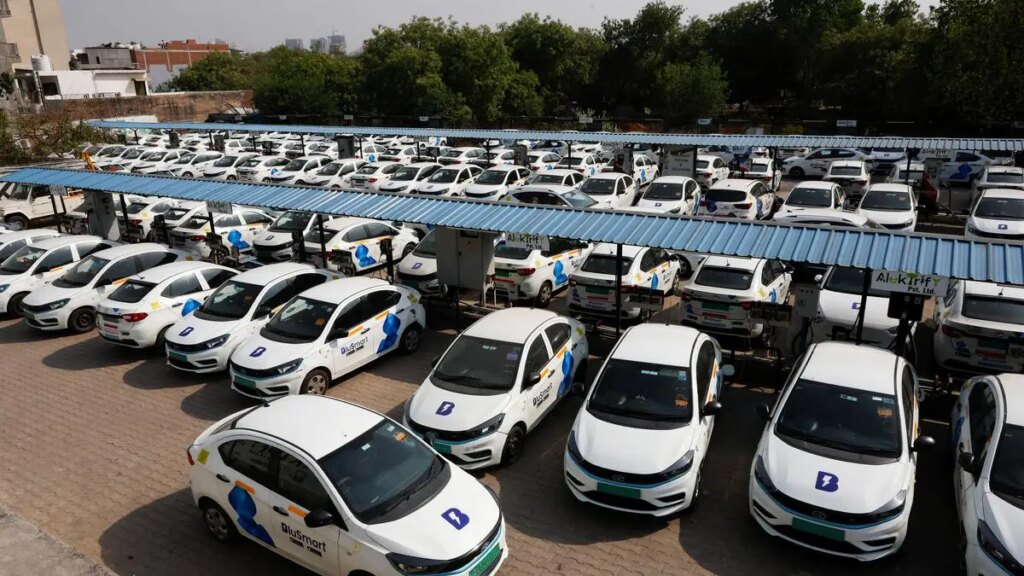
Gensol Fund Diversion: Lending Agencies Explore Legal Options for Recovery
Gensol Fund Diversion: Lending Agencies Exploring Legal Pathways for Recovery
SEBI will now appoint a forensic auditor to examine the books of accounts of Gensol and its related parties | Photo Credit: PRIYANSHU SINGH
The Gensol Fund Diversion controversy has escalated as state-run lending agencies Power Finance Corporation (PFC) and Indian Renewable Energy Development Agency (IREDA) are actively considering various legal options to recover their funds. These options include approaching the Debt Recovery Tribunal (DRT) and initiating proceedings under the Insolvency & Banking Code (IBC). The lenders are expected to finalize their course of action before the end of April, marking a critical development in the ongoing Gensol Fund Diversion case that has sent ripples through India’s clean energy and startup sectors.
Table of Contents
- Legal Options Being Considered in Gensol Fund Diversion Case
- Exploring Criminal Angles Through EOW and SFIO
- Loan Details and EV Purchase Discrepancies
- Strategic Approaches to Fund Recovery
- Government Review of the Situation
- Impact on Start-up and Clean Energy Sectors
- SEBI’s Intervention and Forensic Audit
Legal Options Being Considered in Gensol Fund Diversion Case
Sources close to the matter reveal that the lending agencies are weighing multiple legal pathways to address the Gensol Fund Diversion issue. This deliberation comes in the wake of serious allegations regarding the misappropriation of funds at Gensol Engineering, creating a precarious situation for all stakeholders involved. The crisis has particularly affected BluSmart, a related party to Gensol, which now faces loan default concerns amidst the broader fund diversion controversy.
Critical Timeline
The decision on which legal route to pursue in the Gensol Fund Diversion case is expected to be finalized before the end of April 2025, giving stakeholders a narrow window to prepare for the potential legal implications.
Exploring Criminal Angles Through EOW and SFIO
According to insider sources, preliminary discussions are underway to analyze the Gensol Fund Diversion issue from a criminal perspective. This approach could potentially involve the Economic Offences Wing (EOW) and the Serious Frauds Investigation Office (SFIO), signaling the gravity of the allegations. Under the provisions of the Companies Act, the Registrar of Companies (RoC) has the authority to inspect Gensol Engineering’s financial records.
If the inspection reveals “large instances of financial misappropriation” related to the Gensol Fund Diversion, the RoC can escalate the matter by requesting the SFIO to conduct a more comprehensive investigation into the company’s operations and financial management practices.
Loan Details and EV Purchase Discrepancies
A key aspect of the Gensol Fund Diversion case involves significant discrepancies in the utilization of loans for electric vehicle (EV) purchases. Records indicate that Gensol received substantial term loans totaling ₹977.75 crore from IREDA and PFC. Of this amount, ₹663.89 crore was specifically allocated for the procurement of 6,400 electric vehicles.
However, investigations have revealed that Gensol only acquired 4,704 EVs, raising serious questions about the allocation of the remaining funds. This discrepancy stands at the heart of the Gensol Fund Diversion allegations, suggesting that a significant portion of the loan amount may have been diverted from its intended purpose.
| Loan Detail | Amount/Quantity |
|---|---|
| Total loan from IREDA and PFC | ₹977.75 crore |
| Amount allocated for EV purchase | ₹663.89 crore |
| Planned EV purchases | 6,400 vehicles |
| Actual EV purchases | 4,704 vehicles |
| Discrepancy | 1,696 vehicles |
Strategic Approaches to Fund Recovery
In addressing the Gensol Fund Diversion issue, the lenders are prioritizing financial recovery while considering multiple strategic approaches. “Another is looking at recovering money, first. The idea is to move the Debt Recovery Tribunal,” stated a source familiar with the deliberations.
While insolvency proceedings are also being contemplated in the Gensol Fund Diversion case, sources indicate that this would be considered only as a last resort. This cautious approach stems from the understanding that once the case reaches the National Company Law Tribunal (NCLT), it would supersede all other recovery measures, potentially complicating the lenders’ efforts to recoup their funds.
Recovery Hierarchy in Gensol Fund Diversion Case
- Direct negotiations for voluntary repayment
- Debt Recovery Tribunal proceedings
- Criminal proceedings through EOW/SFIO if fraud is established
- Insolvency proceedings through NCLT (last resort)
Government Review of the Situation
The ramifications of the Gensol Fund Diversion controversy have prompted government intervention, with officials actively reviewing the loan default and fund diversion allegations. Of particular concern to the government is the potential negative impact of the controversy on India’s burgeoning start-up ecosystem and clean energy sector, both of which are strategic priorities for national development.
The Gensol Fund Diversion case presents a complex challenge as it involves BluSmart, which is recognized as a successful start-up and the only all-EV cab service in the country. This unique positioning makes it a valuable contributor to India’s energy transition efforts, particularly in addressing challenges in the hard-to-abate public transport sector.
Impact on Start-up and Clean Energy Sectors
Sources within the government have expressed concerns about how the Gensol Fund Diversion controversy might undermine confidence in India’s start-up ecosystem and clean energy initiatives. The government’s intent appears to be focused on containing the fallout and ensuring that BluSmart does not lose its market value and operational viability due to its association with the controversy.
This careful approach highlights the delicate balance that regulators must maintain when addressing corporate governance issues like the Gensol Fund Diversion case – implementing appropriate punitive measures while safeguarding strategic sectors from collateral damage.
Broader Implications
The Gensol Fund Diversion case highlights the critical importance of robust corporate governance in emerging sectors like clean energy. Stakeholders across the industry are now reassessing internal controls and compliance mechanisms to prevent similar situations.
SEBI’s Intervention and Forensic Audit
Taking decisive action in the Gensol Fund Diversion case, the Securities and Exchange Board of India (SEBI) has announced plans to appoint a forensic auditor. This auditor will conduct a comprehensive examination of Gensol’s accounting records and those of its related parties, with a mandate to uncover any financial irregularities related to the alleged fund diversion.
The appointed auditor in the Gensol Fund Diversion investigation will have a six-month timeframe to complete and submit their findings. Additionally, SEBI has already issued an interim order barring BluSmart Co-founders Anmol Singh Jaggi and Puneet Singh Jaggi from accessing the securities market, signaling the regulatory body’s serious approach to addressing the alleged misconduct.
Key Developments in the Gensol Fund Diversion Case
- PFC and IREDA considering legal options including DRT and IBC
- Potential criminal investigation through EOW and SFIO
- Discrepancy identified in EV purchases (4,704 purchased vs. 6,400 planned)
- Government reviewing impact on start-up and clean energy sectors
- SEBI appointing forensic auditor with six-month investigation timeline
- BluSmart co-founders barred from securities market
As the Gensol Fund Diversion case continues to unfold, stakeholders across India’s financial, energy, and start-up sectors are watching closely. The resolution of this case could set important precedents for corporate governance, regulatory oversight, and the protection of strategic national interests in emerging industries. With multiple agencies now involved and several legal pathways being considered, the coming months will be critical in determining the ultimate outcome of this significant financial controversy.
Published on April 21, 2025






